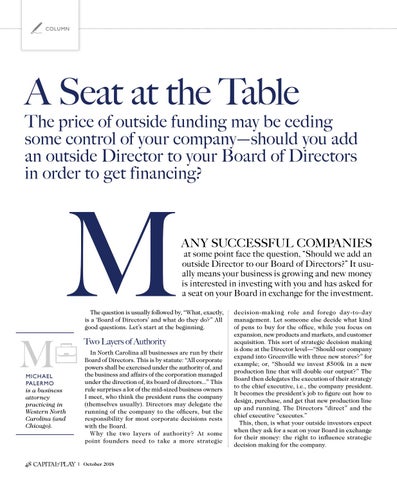column
A Seat at the Table
The price of outside funding may be ceding some control of your company—should you add an outside Director to your Board of Directors in order to get financing?
M
M
michael palermo
is a business attorney practicing in Western North Carolina (and Chicago).
48
ANY SUCCESSFUL COMPANIES
at some point face the question, “Should we add an outside Director to our Board of Directors?” It usually means your business is growing and new money is interested in investing with you and has asked for a seat on your Board in exchange for the investment.
The question is usually followed by, “What, exactly, is a ‘Board of Directors’ and what do they do?” All good questions. Let’s start at the beginning.
Two Layers of Authority
In North Carolina all businesses are run by their Board of Directors. This is by statute: “All corporate powers shall be exercised under the authority of, and the business and affairs of the corporation managed under the direction of, its board of directors...” This rule surprises a lot of the mid-sized business owners I meet, who think the president runs the company (themselves usually). Directors may delegate the running of the company to the officers, but the responsibility for most corporate decisions rests with the Board. Why the two layers of authority? At some point founders need to take a more strategic
| October 2018
decision-making role and forego day-to-day management. Let someone else decide what kind of pens to buy for the office, while you focus on expansion, new products and markets, and customer acquisition. This sort of strategic decision making is done at the Director level—“Should our company expand into Greenville with three new stores?” for example; or, “Should we invest $500k in a new production line that will double our output?” The Board then delegates the execution of their strategy to the chief executive, i.e., the company president. It becomes the president’s job to figure out how to design, purchase, and get that new production line up and running. The Directors “direct” and the chief executive “executes.” This, then, is what your outside investors expect when they ask for a seat on your Board in exchange for their money: the right to influence strategic decision making for the company.
